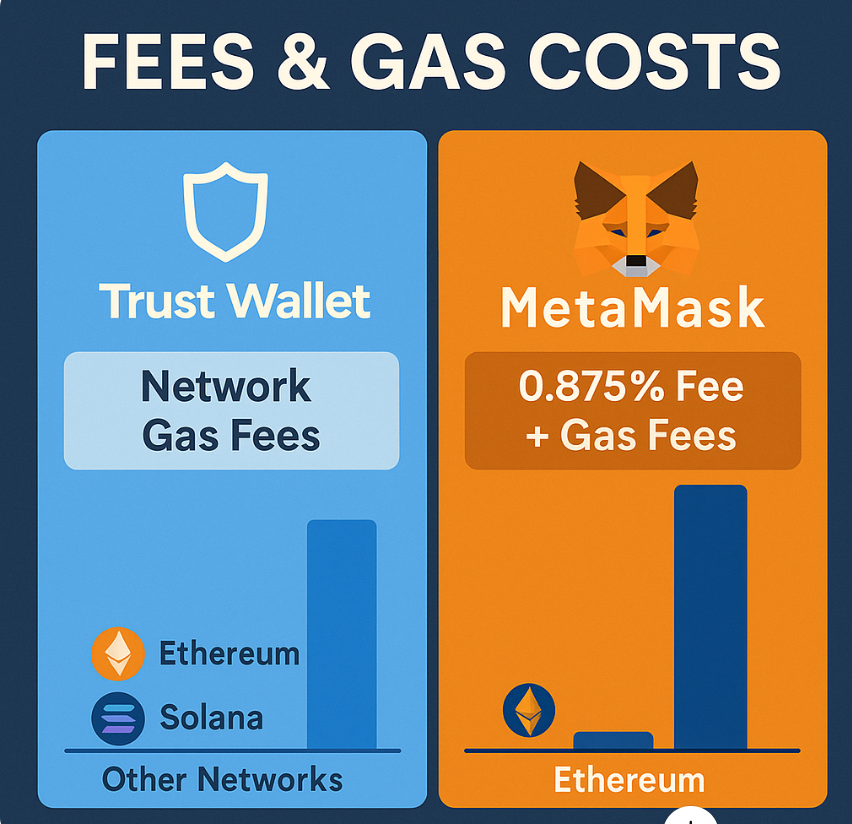Introduction
Wallets for the Web
As of 2025, two of the most frequently used cryptocurrency wallets are Trust Wallet and MetaMask. Both are noncustodial wallets, so you own your private keys and assets. But which one is the best option for your cryptocurrency needs this year? This crowdsourced spreadsheet comparison chart will help you to take a deeper look at their features, security model, ease of use and the blockchains which they currently support.
Supported Blockchains and Asset Compatibility
Trust Wallet currently supports more than 70 blockchains, such as Bitcoin, Ethereum, Binance Smart Chain, Solana and Cardano. This wide reach also lends itself to users who handle a variety of crypto portfolios and don’t want the hassle of juggling numerous apps. Trust Wallet natively supports thousands of tokens and coins, and regularly updates the assets list as it connects with more networks. It also works with NFTs from several blockchains, so it’s a good choice for multi-chain NFT collectors.
MetaMask mainly serves for Ethereum but also EVM-compatible networks such as Polygon, BSC, Avalanche and Arbitrum. Although it is Ethereum-centric, not to miss out the custom networks feature which makes it highly versatile. MetaMask is compatible with all Ethereum-based NFTs and DeFi dApps, acting as a Web3 access point.
User Interface and Experience
Trust Wallet is mobile-first offering for iOS and Android, with simplicity and ease of use at its core. It has built-in DApp browser on mobile and supports biometric authentication like fingerprint and face recognition for extra security. Trust Wallet is for new users and people who need quick access to a handful of different cryptocurrencies.
MetaMask is available through a browser extension for desktop or a mobile app. It provides a more technical experience for power users, especially when it comes to interacting with DeFi protocols and Web3 apps on your desktop. MetaMask has automated lockout, phishing detection, and data encryption. Its UI is complex but it is enough to some beginners.
Security Features
Private keys are kept in both wallets locally, you get a 12 word recovery phrase to recover your access. MetaMask is open source, backed with a big community to improve security and has the possibility to integrate hardware wallets such as Ledger or Trezor for added safety. It additionally features phishing warning system on unsafe websites.
Trust Wallet also supports the leading crypto hardware wallets, including Ledger. It also offers transaction signing confirmations and app-level passwords. The two wallets share the same online threats like phishing that are likely to occur on both platforms, but have security features to ensure user safety.
Token Swapping and Staking
Both wallets include token swaps directly in the app, enabling instantaneous transactions. MetaMask will only support swapping Ethereum-based tokens while Trust Wallet supports swapping tokens across multiple chains (Binance Smart Chain and Solana are also supported), providing more flexibility overall.
For staking, Trust Wallet has native staking with multiple assets such as Ethereum so users have a chance to make some passive income directly from the application. (Clarification: MetaMask, which does not offer broader staking, supports Ethereum staking specifically.)
NFT Support
MetaMask is designed for Ethereum and with a full integration in many of the popular Ethereum-based NFT marketplaces available today so if you’re really serious about your ethereum nft collection, this would be a more practical choice.
With NFTs for multiple protocols Trust Wallet also delivers a broader experience for NFT fans and collectors who want to work with multi-chain in this new space.
Fees and Costs
Both require users to pay network gas fees in the form of transactions, swaps and staking. MetaMask imposes a 0.875% swap fee and this can make it more costly to transact. There are no swap fees in addition to any gas fees for transaction on the blockchain that users need to pay. Gas fees on Ethereum are much higher in contrast to some other networks, which is available through Trust Wallet such as Solana and Avalanche, which could be cheaper.
What Wallet Are You Going to Use in 2025?
| Criteria | Trust Wallet | MetaMask |
|---|---|---|
| Best for | Beginners, multi-chain users, mobile-first | Power users, DeFi degens, Web3 in desktop |
| Supported Blockchains | 70+ chains like Bitcoin, Solana, Cardano | Ethereum + EVM chains (such as BSC, Polygon, Arbitrum) |
| NFT Support | Multi-chain NFT support | Ethereum-focused NFT marketplace integration |
| Token Swaps | Supports multiple blockchains | Mostly Ethereum-based tokens |
| Security Features | Biometric, Ledger support, app-level passwords | Open-source, hardware wallet support, phishing protection |
| Interface | Mobile app, simple and intuitive | Browser extension + mobile app, a bit more complicated |
| Fees | Wallet/APP does not charge the swap fees, only the gas fee of the network | 0.875 percent swap fee + network gas fees |
| Staking | Supports staking for various assets | Supports staking for Ethereum only |
Before you dive deep further read related on How to Start Investing in Crypto in 2025: A Beginner’s Guide and A Beginner’s Guide to Smart Investing
Final Thoughts
Trust Wallet is great for anyone looking to have a mobile wallet which can offer support for many type of coins and blockchains, multi-chain NFTs and integrated staking. It’s beginner-friendly, and allows for a multi-chain approach that remains accessible to the general crypto holder/collector in 2025.
For power users in Ethereum-based DeFi and NFTs, especially on desktop, MetaMask is still the way to go. It’s open-source, integrates even better with Ethereum dApps and hardware wallets and therefore is the best Web3 gateway for power users.
Which you prefer will depend on what’s most important to you, whether broad support for all things crypto and ease of use (Trust Wallet) or the most powerful Ethereum and DeFi experience (MetaMask).
Both wallets are still under development, and 2025 introduces significant enhancements in terms of security, usability and multi-chain capabilities — thus you can choose the one according to your crypto journey.
